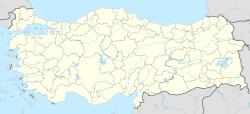| Location | Turkey |
|---|---|
| Region | Karaman Province |
| Coordinates | 37°21′03″N 33°16′17″E / 37.3508333333°N 33.2713888911°E |
Derbe (Greek: Δέρβη), also called Derbeia (Greek: Δέρβεια),[1] was a city of Galatia in Asia Minor, and later of Lycaonia, and still later of Isauria and Cappadocia. It is mentioned in the Acts of the Apostles at 14:6, 14:20, 16:1 and 20:4.
Location
Strabo places Derbe “on the sides” of Isauria, and almost in Cappadocia.[2] Elsewhere, he says it was in the eleventh praefecture of Cappadocia.[3] When the apostles Paul and Barnabas visited Derbe, it was in Lycaonia. Stephanus of Byzantium places Derbe in Isauria.[4]
In 1956, on the basis of an inscription dating to 157 BC, Michael Ballance fixed the site of Derbe at a mound known as Kerti Hüyük, some 15 miles (24 km) northeast of Karaman (ancient Laranda), near Ekinözü village in modern-day Turkey.[5] Although subject to controversy, this is considered the most likely site.[6][7]
History
Antipater of Derbe, a friend of Cicero,[8] was ruler of Derbe, but was killed by Amyntas of Galatia, who added Derbe to his possessions.[9][10]
Claudioderbe was a special title given to Derbe during the reign of the Roman Emperor Claudius; it appears on second century coins from Derbe.[5]
The apostles Paul and Barnabas came to Derbe after escaping a disturbance and survive the stoning in Iconium, about 60 miles away,[6] and successfully evangelized there.[11] Paul and Barnabas returned there after being stoned again in Lystra.[12] On these experiences, Paul commented, "We must through many tribulations enter the kingdom of God."[13] He and Silas later visited Derbe again.[14]
The Bishopric of Derbe became a suffragan see of Iconium. It is not mentioned by later Notitiae Episcopatuum. Just four bishops are known, from 381 to 672.[15]
Derbe is included in the Catholic Church's list of titular sees.[16]
References
- ^ Stephanus of Byzantium, Ethnica, §D225.2
- ^ Strabo. Geographica. p. 569. Page numbers refer to those of Isaac Casaubon's edition.
- ^ Strabo. Geographica. p. 534. Page numbers refer to those of Isaac Casaubon's edition.
- ^ Stephanus of Byzantium. Ethnica. s.v. Δέρβη.
- ^ a b Fant, Clyde E.; Reddish, Mitchell G. (2003-10-23). A Guide to Biblical Sites in Greece and Turkey. Oxford University Press. ISBN 978-0-19-988145-1.
- ^ a b Bastian Van Elderen, Some Archaeological Observations on Paul’s First Missionary Journey, 157-159.
- ^ Steve C. Singleton, Derbe, from Bible Atlas from Space, Deeperstudy.com.
- ^ Cicero, Ad Familiares, xiii. 73
- ^ Strabo, XII,i, 4; vi, 3
- ^ Dio Cassius, XLIX, xxxii)
- ^ Acts 14:6–21
- ^ Acts 14:20
- ^ Acts 14:22
- ^ Acts 16:1
- ^ "Derbe". Catholic Encyclopedia. Retrieved 2007-02-17.
- ^ Annuario Pontificio 2013 (Libreria Editrice Vaticana, 2013, ISBN 978-88-209-9070-1), p. 880
![]() This article incorporates text from a publication now in the public domain: Smith, William, ed. (1854–1857). "Derbe". Dictionary of Greek and Roman Geography. London: John Murray.
This article incorporates text from a publication now in the public domain: Smith, William, ed. (1854–1857). "Derbe". Dictionary of Greek and Roman Geography. London: John Murray.
